ONLY TIME WILL TELL: Seditionist Oath Keepers sentenced amid tears and promises of redemption
When they came to Washington, D.C. on Jan. 6, 2021, and terrorized the U.S. Capitol, the Oath Keepers hellbent on advancing a seditious conspiracy to keep Donald Trump in the White House were self-righteous and self-professed warrior patriots.
But in the cold light of reality inside a federal courtroom blocks from the U.S. Capitol this past week, some of those self-stylized “warriors,” were rendered to spittling, Kleenex-clutching tearful heaps as they finally faced the consequences of their actions and U.S. District Judge Amit Mehta prepared to sentence them to prison.
Oath Keepers Roberto Minuta, Edward Vallejo, David Moerschel, and Joseph Hackett went to trial last December and a jury found them guilty in January on multiple counts including sedition and conspiracy to obstruct Congress from certifying the 2020 election. The men were sentenced over two days and roughly a week after leaders of the conspiracy like Oath Keeper founder Elmer Stewart Rhodes, Kelly Meggs, Jessica Watkins, and Ken Harrelson were sentenced.
Roberto Minuta
No longer sporting tactical gear or chemical spray on his hip as he did on Jan. 6 while assaulting and taunting police, Oath Keeper Roberto Minuta appeared Thursday clad in a dark suit with hair neatly coiffed. His eyes rarely lifted to meet Judge Mehta’s as he read from a prepared statement seeking mercy in the face of the Justice Department’s 17-year-sentence recommendation.
Where Minuta had once followed Stewart Rhodes faithfully, in these last moments before sentencing, he sought to set himself apart from him. It was only now, Minuta explained with a calm and even tone, that he realized how profoundly “misled” he had been.
Rhodes’ leadership was “deranged,” he added.
When he was seemingly less repelled by Rhodes, Minuta purchased some 5,500 rounds of ammunition in the days before Jan. 6 and while participating in numerous chats where the group’s operations were discussed. It was in mid-December 2020 when he began talking with Rhodes about the need to do something other than peacefully protest if they were to keep Trump in office. He had raved on a Facebook live stream about election fraud and wailed that the “integrity of our democratic system is fucking dead.”
To stand by the results of that year’s election, he continued, would “lead to the boot of the government on your fucking face for eternity.”
For Roberto Minuta, by his own admission, by December 2020, the nation was already at civil war. When another leader of another extremist group, Proud Boy honcho Henry “Enrique” Tarrio posted messages online praising “lords of war” who took to the streets in support of Trump, Minuta posted messages in support online. He would echo similar notions about “war in the streets” on Jan. 6 where he was recorded speeding away from a nearby hotel on a golf cart. He was initially posted up at the hotel as a member of ratfucker Roger Stone’s security detail.
Minuta’s voice didn’t shake as he spoke to Mehta. He told the judge he had waited a long time to speak to him directly. He told the court he “cringed” at his “embarrassing use of language” and his “display[s] of anger” in the evidence presented.
A line had been crossed on Jan. 6 that destroyed the legitimacy of what he thought was a peaceful protest, he said, and when he taunted police, it was this belligerence that added to their stress.
Notably, on his way out of the Capitol, Minuta took the time to shove his fingers in an officer’s face as he screeched that “all that is left is the Second fucking Amendment.”
“The recipients of my verbal belligerence were undeserving and it was misplaced frustration…as a father, I would be embarrassed for my children to see me behaving how I did that day. It would be a perfect example of how not to behave. My poor judgment didn’t stop at belligerence. I entered the Capitol, alarms blazing, chemical irritants in the air, and despite my instincts not to go in, I did,” Minuta said.
And then, though the 38-year-old Oath Keeper would rebuke Rhodes and disavow the Oath Keepers, he nonetheless propped up a wafer-thin defense that has time and again been blown apart by evidence and dismissed by the courts: on Jan. 6 he was helping police, not harming them.
“I had an opportunity to help police and I blew it,” Minuta said. “While using my own words as their evidence, it does not look like I was helping police. I failed at assisting police that day and I now perceive myself as an added stressor in what was already a terrible situation.”
Judge Mehta acknowledged that while Minuta was not necessarily a leader in the way that Kelly Meggs or even Jessica Watkins had been, he nonetheless inspired other Oath Keepers to join a conspiracy analogous to treason.
It may have only been dozens of Oath Keepers who entered the Capitol on Jan. 6, but when they went up the Capitol stairs, they inspired others to do the same.
But unlike others in the mob that day, Mehta said Minuta clearly understood, at a minimum, that when he showed up, violence was possible. After all, he was prepared to engage in it himself. There was a trail of communications leading up to the 6th proving this and it wasn’t just overheated rhetoric, the judge said.
He wasn’t charged with seditious conspiracy because he was belligerent.
“You are not being charged and convicted because of your words. It is because they reflected your state of mind and gave us a window into what you were thinking and why you came to Washington… when you told [Proud Boy] Dominic Pezzola who you just met that Stewart Rhodes thinks the ‘time for peaceful protest is over,’ – the fact that a lightbulb didn’t go off to you at that point to avoid any further contact with Rhodes, to avoid contact with Oath Keepers, or to avoid coming to D.C. on Jan. 6, what inference should one draw?” Mehta said.
The judge, who is a former public defender with a frequently even-keeled, almost understated delivery, sounded exasperated.
He sighed deeply.
Minuta hadn’t simply lost his way on Jan. 6, the judge said.
Though he empathized with Minuta over the closure of his tattoo parlor during the height of the Covid-19 pandemic and even his frustrations over how civil unrest in 2020 metastasized, these factors had still blinded him to better sense. And what was worse, the judge acknowledged, was that despite the show of contrition in court, he still stood before him today contending that he helped police on Jan. 6.
Opening his eyes wide and looking into Minuta’s face, Mehta said: “You weren’t there to help them. You may have convinced yourself of that but there isn’t any shred of evidence that would be consistent with that intent…and on the way out, you taunted police more. And as you are walking out of the building, after they have laid their own bodies on the line, you don’t thank them. You vilify them some more. There’s nothing that crossed your mind to assist police. You and I will have to agree to disagree on that.”
The law, he added, also did not permit Minuta to cloak himself in the tradition of the Founding Fathers. Nor does the Second Amendment give him or anyone else the right to battle the U.S. government.
Given the limited role of his actions in comparison to other conspirators and a lack of evidence supporting claims by the prosecution that Minuta was a leader of Oath Keepers in New York more broadly speaking, Mehta departed significantly from the Justice Department’s sentencing recommendation and gave Minuta just 4.5 years.
Edward Vallejo
Where Minuta was stoic, 64-year-old Oath Keeper Ed Vallejo was overcome with emotion, openly sobbing while speaking to Judge Mehta. Vallejo cut a much different figure in court than he did in footage from the 6th. The wild unkempt beard he sported in 2021 was gone. He appeared frail as his white dress shirt billowed around his torso. His hands shook as he grasped a hard copy of his statement.
An Army Veteran sober for 40 years after a battle with alcoholism following the loss of his son, Vallejo drove 2,300 miles from his home in Arizona to Washington, D.C. fueled by disinformation. In this way, Mehta acknowledged, Vallejo and others suckered in by disinformation were victims in their own right.
“That doesn’t mean people aren’t responsible for their own actions,” Mehta said.
In late 2020, Vallejo had faithfully shared an open letter that Rhodes had issued in December calling on Trump to invoke the Insurrection Act so Oath Keepers could be raised to help him stay in power. By the 6th, he was tapped to oversee a stockpile of weapons dumped at a hotel in northern Virginia. The cache was transported by Oath Keepers from around the U.S. The hotel, just outside of Washington and across the Potomac River, was dubbed a “quick reaction force” or “QRF.”
Though at trial Oath Keepers maintained the QRF was a defensive maneuver only and arranged to support their security detail for Trump VIPs and the like, no such evidence to support this claim ever emerged and Judge Mehta summarily and repeatedly dismissed the notion at sentencing.
Before Vallejo delivered a tearful plea, Mehta reminded Vallejo that on the morning of the 6th, it was he who went on a podcast with fellow Oath Keeper Todd Kandaris and boasted of unloading rifles (albeit indirectly) and then proceeded to speak of the need for “guerilla warfare” and armed conflict if the certification didn’t go as they wanted it.
It was Vallejo who spoke of the Oath Keepers as the “final check and balance” on the process. He also mentioned on the podcast that the people on the ground in Washington that day were prepared to do more than taunt police.
Where Vallejo’s defense attorney Matthew Peed argued those words were bloviations from a “goofy” man, Mehta disagreed.
There were multiple texts Vallejo sent to Rhodes during the attack, telling him he was ready to deploy if someone said the word. There were media interviews revealing his intent to advance the seditious conspiracy. There was also witness testimony at trial stating that Vallejo and Kandaris told Oath Keepers supping at Olive Garden after the attack that they were “waiting to be called to the Capitol.” And if that were not enough, Mehta pointed out, instead of leaving D.C. in short order, on the morning of Jan. 7, Vallejo returned to the Capitol and surveilled and probed police lines to see how law enforcement had responded in the aftermath. Messages show the Arizona Oath Keeper told Rhodes he would only return home if the founder ordered it. He was willing to stay on hand to deliver “after action reports” that would begin after the inauguration, he said.
And when Kandaris asked Rhodes what to do after the 6th, it was expressed plainly that he and Vallejo were excited about the “next steps.”
Mehta speculated last week on why, ultimately, Rhodes didn’t answer Vallejo’s call to activate the QRF and start hauling guns and rifles and ammunition into Washington.
“I think only Mr. Rhodes knows… perhaps he thought it would take too long to get weapons in or perhaps Mr. Rhodes knew, being the Yale law school graduate that he is, it wouldn’t be wise to respond to Mr. Vallejo, saying he can bring weapons in,” Mehta said.
During the prosecution’s allocution, assistant U.S. attorney Louis Manzo asked the judge to consider: What if Rhodes’ mind had ticked a little bit differently at that moment?
“Is there any doubt in your honor’s mind that Vallejo would have delivered?” Manzo said.
The confidence he had in January 2021 was missing in action this week. Vallejo wiped his nose profusely as he spoke through tears, his voice quaking. His cries grew slightly deeper while he hung his head and offered an apology to U.S. Capitol Police Officer Harry Dunn and other members of law enforcement.
Dunn delivered a charged victim impact statement in May along with Metropolitan Police Officer Chris Owens.
“It hurt me so bad that [Officer Dunn] is going through so much hurt,” Vallejo rasped, crying through his mea culpa. “I would do anything to help console him… my heart went out to him… I wish with all my soul I had never went… I wish I never associated with Stewart Rhodes… I see now how wrong and foolish I was… my life has been destroyed by this catastrophe in so many ways. I doubt I will ever fully recover from it.”
Vallejo’s wife, who is 70, is unable to care for their rescue animals or their home if she is alone and he is incarcerated for a significant length of time, he said. Telling Judge Mehta he was a changed man who had “sworn off” politics, the internet, and the outside world and that he had started removing tattoos related to the Oath Keepers and his recent past from his body.
“This wasn’t simply a belief that ballots had been miscast or ballots were brought in illegally. You know, Mr. Vallejo, I can appreciate that concern and that people had it and have had it. And you weren’t alone in that. Whether it was because you genuinely believed it based on your own review of evidence or the former president convinced you of it, you still are where you are,” Mehta said.
There is a process, he emphasized.
Trump went through the courts and failed to prove election fraud. There was nothing there, Mehta said.
But there was a process.
“What can’t happen is a willingness to take up arms when the process didn’t work out the way you had hoped it would. It can’t be that dozens of judges got it wrong. It just cant be. I can’t imagine a single judge didn’t look at it carefully… if you believe in democracy, you take the good with the bad. You take the results you don’t like,” Mehta said. “Go out into the streets and protest peacefully, sure. Hope for a better outcome, of course. But you can’t conspire to undo a result because you and a group of your cohorts believed that process failed you.”
Though prosecutors sought 17 years for Vallejo, Mehta only sentenced him to 3 years in detention and one year in home confinement after he is released. The departure in sentencing was somewhat expected after the light touch given to Minuta. Unlike Minuta, Vallejo was not at the Capitol and never went inside. His advanced age was also a boon.
David Moerschel and Joseph Hackett
To close out the week, Oath Keeper and former neurophysiologist turned-convicted-seditionist David Moerschel was also sentenced.
Right behind him was Oath Keeper and former chiropractor Joseph Hackett.
It was Moerschel and Hackett who coordinated the transport of weapons to the QRF with Kelly Meggs, a top leader under Rhodes. Moerschel joined a key text channel Oath Keepers used to communicate on Dec. 20, just one day after Trump invited his supporters to descend on Washington via Twitter. By Christmas Eve, Moerschel told Oath Keepers he thought Trump would wait until every avenue legally had been exhausted before he invoked the Insurrection Act but when Oath Keepers showed up, they would have firearms near D.C. if needed. Moerschel had pondered then: why else would Trump call them up?
On Christmas Day 2020, Moerschel, who reminded Judge Mehta of his devotion to god and missionary work during his sentencing last week, told Oath Keepers in a group chat that he thought then-Vice President Mike Pence wouldn’t stand by Trump. It was also here that Oath Keeper Jeremy Brown told him he thought the nation was on the brink of war and Moerschel replied by telling Brown about his guns and how he wanted “extra knockdown power” on the 6th.
He ended up bringing an AR-15 as well as a .45 caliber handgun to the hotel in Virginia.
“He didn’t do this for any other purpose than to wait for Trump or Kelly Meggs or Stewart Rhodes to tell him to use them,” Assistant U.S. Attorney Troy Edwards said Friday. “The safety of our community and balance of our democracy should not hinge on the impulses of madmen. I don’t believe Mr. Moerschel would have ignored someone like Mr. Meggs or Mr. Rhodes should they have said, ‘Go grab the firearms.’”
On the 6th, Moerschel went along with the first stack of Oath Keepers and got inside for just under 15 minutes. Like he had helped provide support with the weaponry, Mehta noted that his presence with the stack contributed to the overall force used to stop proceedings.
Moerschel rarely lifted his head as his attorney, the judge and prosecutors reviewed the court’s factual findings of his case. Instead, he kept his eyes glued to a paper in front of him. On occasion, the 45-year-old would shift in his seat, clasping closed hands near his mouth as if he was in silent prayer.
Tall and thin with the contours of his face sharply angular, Moerschel approached the podium and offered a quick preface to his allocution: His wife wasn’t present because they were unable to arrange care for their three children. His voice was clear as a bell as he said this and then, as if on cue with the first word of his prepared remarks, Moerschel’s voice began to quake immediately.
If there were tears, they were not immediately or as clearly visible, unlike with Ken Harrelson, Kelly Meggs, Jessica Watkins, and Ed Vallejo. Where their faces had flushed, where their tears had flowed, where they were undeniably overcome as they hit random points throughout their remarks—usually triggered by the first mention of a family member they had shamed—Moerschel did not emote as strongly though the sounds of weeping were there, however.
Moerschel said when he was on the Capitol steps, he had a revelation.
“I felt like God said to me, ‘get out of here’ and I didn’t and I disobeyed God and I broke laws. I’m not sorry because I’m being punished. I’m sorry because of the harm that my actions have caused other people,” he said.
Jan. 6 contributed to a national crisis, he added.
He was sorry for what it had done to his family. In the wake of his indictment, Moerschel lost his job as a neurophysiologist and has since taken work as a landscaper in Florida. (Moerschel, Vallejo, Minuta, and Hackett were granted bond ahead of trial.)
Mehta remarked on his good upbringing, education, and loving support system. Perplexed how he ultimately ended up on a road to ruin, Mehta told Moerscshel he thought he was a “smart guy” up until the fall of 2020.
During his remarks, the Oath Keeper riffed to Mehta: he appreciated the compliment but his actions were “really dumb.”
Leaning foward with eyes wide, Moerschel quipped: ”I don’t mean anything bad about Kelly Meggs but he’s a used car salesman and it was really dumb to follow that guy.”
Before rendering the sentence, Mehta told Moerschel that at a time, perhaps his joining the Oath Keepers was rooted in something more noble. He told him he could understand how joining a group of like-minded individuals and then treating that group as a primary source of community, validation, or even “news” could infiltrate one’s thinking.
“It is something that can suck you in like a vortex,” Mehta said. “And it is very difficult to get out. That is not an uncommon story.”
Moerschel’s lawyer Scott Weinberg argued that but for Trump’s tweet on Dec. 19, his client would have never come to D.C. at all. In effect, Moerschel was taken in by conmen like Rhodes and Trump, Weinberg argued.
He was “naive,” he said.
Moerschel was sentenced to just 3 years in prison though prosecutors sought 10. Mehta explained this was because Moerschel came to the conspiracy later than other members, was inside the Capitol very briefly, and did not appear to personally shout at or accost officers. He noted too that Moerschel disassociated with Oath Keepers and had no further dealings with the group after the 7th.
Fellow Oath Keeper Ken Harrelson, who received a 4-year sentence, did not do this. He kept talking to Meggs after the fact.
“Look, sentencings are—each person is unique and the reasons for sentences are unique to each individual. But I want to say something I haven’t said so far: Sentencings shouldn’t be vengeful or such that it is unduly harsh for the sake of being harsh… different periods of incarceration apply to different people for various reasons,” Mehta said Friday.
Oath Keeper Joseph Hackett, once a chiropractor with a flourishing practice, was sentenced to 3.5 years though prosecutors sought a 12-year term.
Wearing a light gray suit and somber expression, Hackett grew emotional and like Vallejo, was overcome though his voice was soft and quiet. He hadn’t realized, he told the court, just how much damage he had done on the 6th, or how many people were scared of him.
It wasn’t until police officers testified that he realized the “full measure” of his actions, he added. He also admitted: he had been too busy thinking of the damage he had caused his own family.
“I have destroyed my life,” Hackett said.
He hated himself, he said. And he really hated himself for hurting his daughter and wife who had received death threats since he was first exposed as a rioter at the Capitol.
“I am the reason we are not enjoying a happy and normal life,” he said.
Angie Halim, Hackett’s defense lawyer, called Hackett a “head-burier” who didn’t get involved with Oath Keepers to be extreme or political. The Oath Keepers didn’t get extreme until the country got extreme, she argued. Trump was saying the election was stolen, high-ranking politicians were too, and, she added, some media outlets failed to dispel the lie, not helping matters. In a flowery blame-shifting plea for her client, Halim beseeched Mehta to “trudge through the layer of human complexity” as he weighed a sentence.
Hackett, she said, was “scared of his own shadow” and had been for the last two years.
Hackett was no Rhodes. He was no Meggs either. But he was a recruiter for Oath Keepers who wanted to join the fray on the 6th.
Mehta acknowledged this as well as the fact that Hackett brought at least one gun on his trek to DC. While evidence wasn’t concrete at trial, according to the Justice Department, Hackett also very likely added an AR-15 to the QRF.
Though Hackett wasn’t inside the Capitol for long, he still showed up in tactical gear and then once inside, ended up lurking outside of then-Speaker of the House Nancy Pelosi’s office.
In a statement seeming to signal a direct rebuffing of those who claim the Oath Keepers acted properly under the First Amendment, Mehta made a point to note that he agreed with prosecutor Alexandra Hughes’ take on Hackett’s involvement with the organization:
To the extent that the Oath Keepers were a lawful organization with lawful intent, it would have been fine for Hackett to participate. But the lawfulness component changed while he was an active party and “in it” for some time.
Hackett sat up straight in his chair as he heard his sentence. He nodded almost imperceptibly as Judge Mehta reviewed the terms of his supervision. His face didn’t look tense. He looked passive, almost accepting of his fate. In the clatter of his last moments in the courtroom, as lawyers began to gather their things, Mehta told him though his words might sound hollow, he hoped the life he lived before the fall of 2020 was something he could one day reclaim.
“Make your wife, daughter, and country proud,” Mehta told him.
Hackett smiled at the judge warmly, closing his eyes for a moment before nodding and mouthing subtly: “Thank you.”

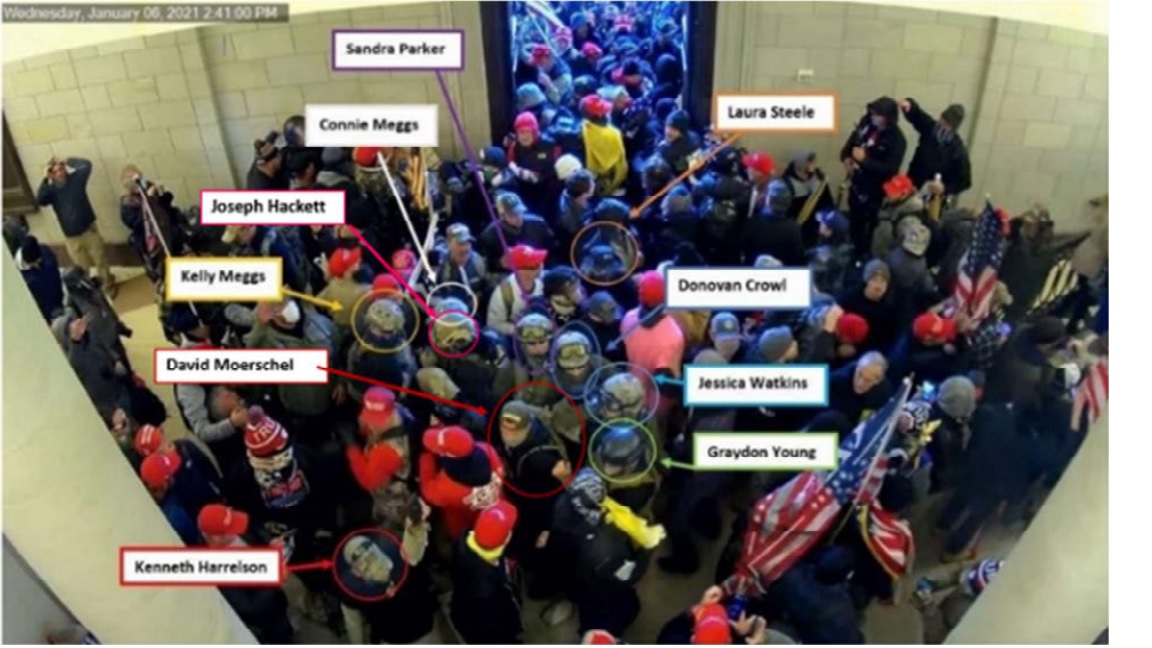
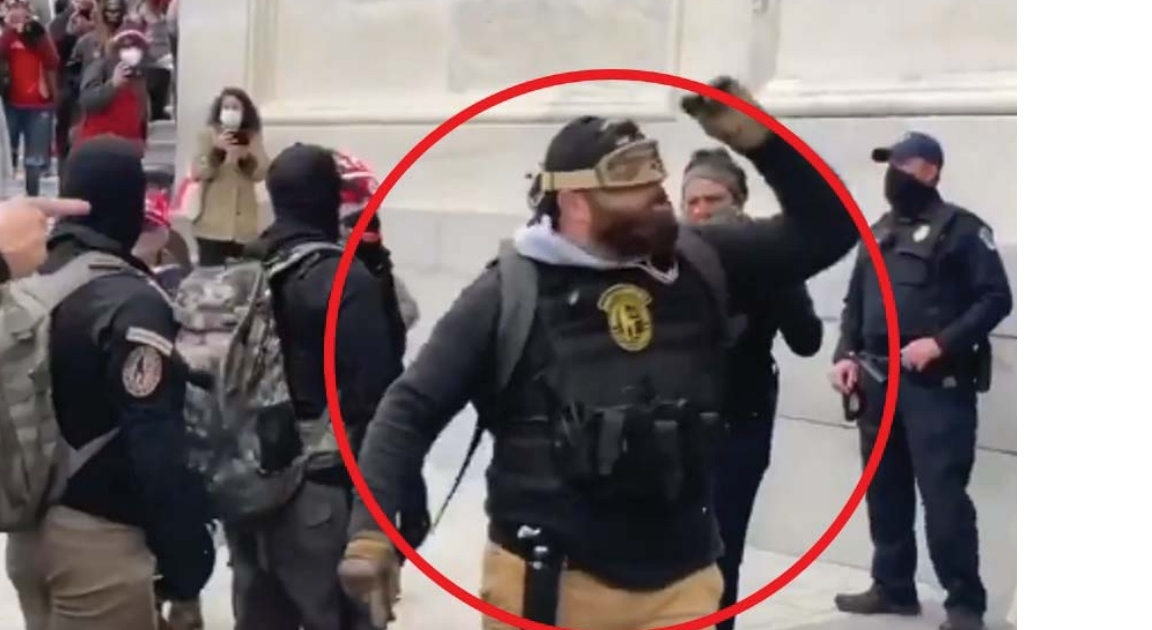
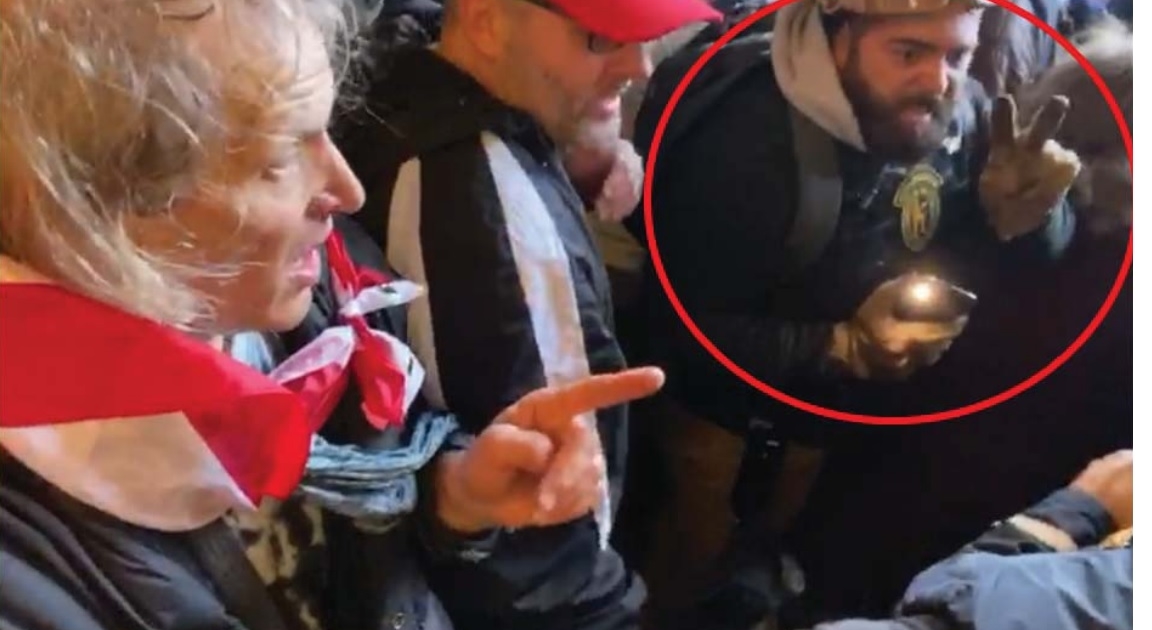
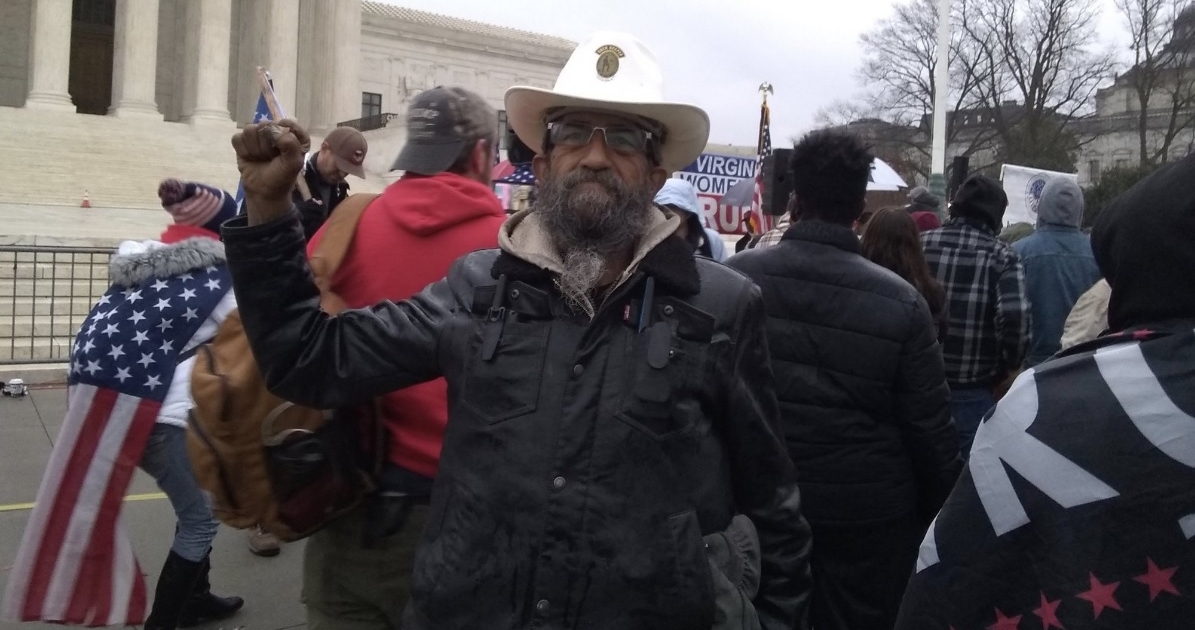
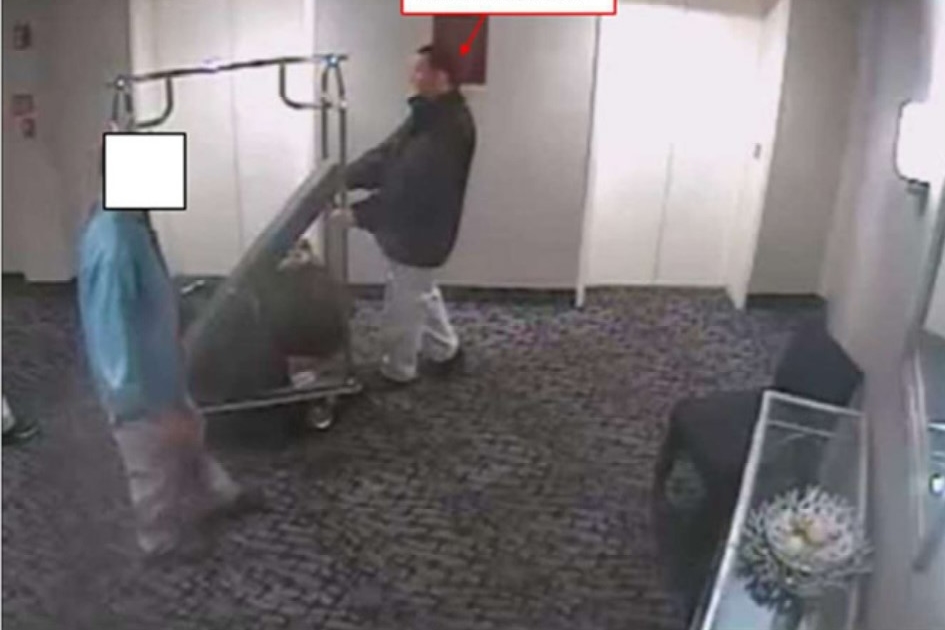
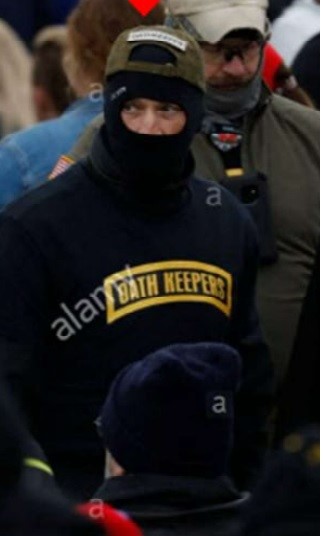
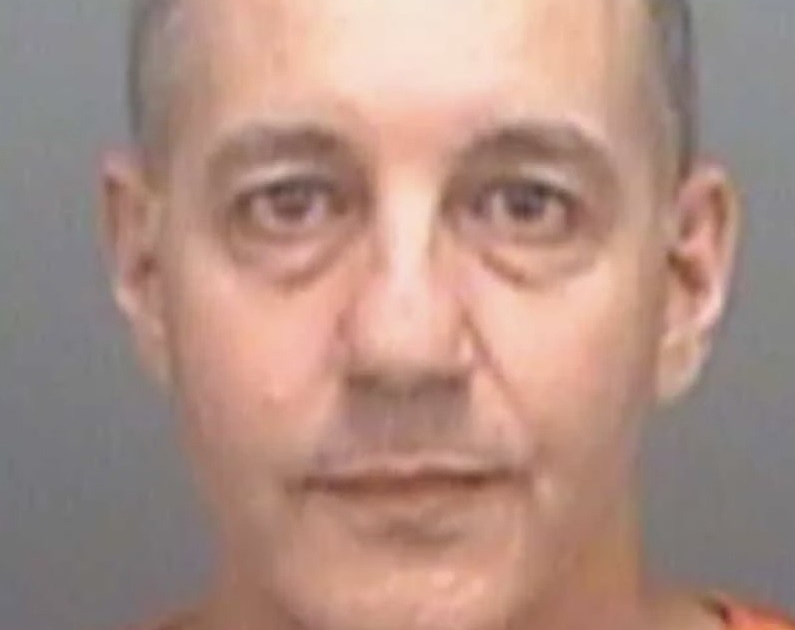



Well written and to the point.
I’m glad these shorter sentences will still have them in jail for the next presidential inauguration.
You’re really killing it with this series, Brandi—thanks so much for your vivid & insightful coverage. It’s like being right in the courtroom!
Agreed, ERX. THANK YOU, Brandi.
I wrote for various newspapers for 15 years, so I understand the stress of deadlines and worrying incessantly over a single word or phrase. What an OUTSTANDING piece. Brandi could not do a better job in describing this awful period of American history. STANDING O!
Thank you for some compelling reading
“Well it looks like the cows are coming home to roost”.
– (Frank Drebbin)
Someday, I hope Ms. Buchman’s accounts of this gallery of rogues will be engraved and given permanent and prominent museum space in DC.
Public recognition of all efforts to assert J6 justice and understanding would be valuable.
Perhaps there is an appropriate location in public areas of DoJ space.
Brandi: Thank you for your amazing reporting. You are truly a National Treasure.
“….. The Oath Keepers didn’t get extreme until the country got extreme, she argued. Trump was saying the election was stolen, high-ranking politicians were too, and, she added, some media outlets failed to dispel the lie, not helping matters…..”
Either through violence or legislation, a certain political party and some of its adherents came too close to their openly stated objective of nullifying my vote. Fours years is hardly enough, even for the low hanging fruit, but there are many others working in the same building they attacked that are just as culpable.
Exactly. I read those defender’s words and thought that here’s another example of deflection/denial. And yes, many occupying that building are at least as culpable.
Brandi:
This is fine reporting. I am curious were these guys also given any sort of probation after their sentences? Also, did they receive financial penalties (fines, restitution of any kind)?
[Welcome to emptywheel. Please choose and use a unique username with a minimum of 8 letters. We are moving to a new minimum standard to support community security. Because your username is far too common it will be temporarily changed to match the date/time of your first know comment until you have a new compliant username. Thanks. /~Rayne]
Perhaps a book one day. But not one that just recounts the trials and sentences.
One where you could interview most, if not all, of the convicted after a few sobering months in prison and get their story as to how they came to be where they were and did what they did in the lead up to Jan 6th and that day.
I suppose, I “assume”, there might be more sober reflection by that time and not just stories used in defense of their actions.
And that sober reflection put into their words by you might serve some good for others.
You are the best.
That would make a fascinating book!
[Welcome back to emptywheel. Please use the same username each time you comment so that community members get to know you. This is your second user name; you’ve also published comments as “CJ-FL.” Please confirm you’ve switched to “RoseGold” permanently. Thanks. /~Rayne]
New, 8 letter name confirmed.
[Thanks for updating your username to meet the 8 letter minimum. /~Rayne]
The thought it is ok to hurt or kill other Americans is not patriotic. This mindset is not going anywhere anytime soon.
They grouse and sputter daily. When they repeat the word communist about dems, and woke folk, it’s because they are justifying in their minds, it’s ok to kill these people because in America it’s ok to kill communists. .
Sickening. Seriously frightening.
I personally found it surprising that these four received such light sentences. On the other hand, Mehta has a much more detailed view of what these guys did and what they may or may not be capable of, whether they might be lying, etc, etc.
Thanks Brandi, I have enjoyed your whole trial series (including the Daily Kos era) and especially the sentencing part.
Thanks Emptywheel for bringing Brandi on board.
People like Elmer Stewart Rhodes and his cohorts have long been with us. (I started journalism classes at a college paper under threat of libel suit by a local right-wing hothead, who’d been called ‘a Nazi-fascist’ by a respondent in an opinion poll). Back then they were seen as fundamentally ridiculous, and hadn’t been gifted with the means to widely promote their agenda(s) without serious consequences. I cleaned their mimeographed racist handouts from local library shelves as a favor to the librarians. The task was a lot easier back then.
Brandi,
You are a born court reporter. I hope you find work in this field because it would be a loss if you didn’t. The CEO’s of media corporations think interest has waned. It has not. And when the public doesn’t hear, the CEO’s believe no one cares anymore. That is like a dog chasing its tail and it is not true.
Jan 6th 2021 was a horror to most Americans and knowing some of our leaders played a significant role will haunt us until we begin to fully understand why that day happened. Your contribution to that understanding is a giant step in that direction. Thank you.
Thank you Brandi for your gift of recording history so well, with creative style and attention to detail.
Hope your book keeps tabs on these misguided souls after they’ve served their time.
No better reportage on these trials available anywhere. An actual national treasure. Deepest thanks.
“He hated himself, he said. And he really hated himself for hurting his daughter and wife who had received death threats since he was first exposed as a rioter at the Capitol.”
I have a hard time believing these “death threats” really existed. Not that it was relevant to this trial, but has any evidence that this actually occurred ever been reviewed anywhere?
Many in the FAFO romper room certainly got social opprobrium and fired for their jobs and such, but their opponents simply are not by character “second amendment solution” type of people. And, as we all know, every accusation by a Republican is in fact a confession.
I have terrible trouble believing the “expressions of contrition,” and suspect that most of them were suggested/proposed by the defendant’s lawyers. While waiting to be sentence these guys were doubtless home watching Fox or OAN and getting their daily dose of fear and hate. I very much doubt any of them have changed.
I’d very much welcome a comment on this from one of our practicing lawyers. Is my skepticism wrong? Has the “expression of contrition” become a basic part of our courtroom rituals?
Yes, and it always has been for criminal sentencings. In fact it is codified into the Federal Sentencing Guidelines. Occasionally a defendant will refuse so as to preserve a claim of innocence for appeal.
Do the ones who refuse to express contrition get worse sentences?
I have to say that this whole “contrition ritual” feels a little ugly to me.
Usually.
On the other hand, preserving the ability of those sentenced to address the court and the public is likely something that is worth preserving.
Agreed, but it should be optional and not factor into sentencing.
We’ll have to disagree about that then. The person being sentenced should always be able to have their say at sentencing. If not, there would be pressure to get some prisoners to waive the right. Having it be mandatory means that no such pressure will work to prevent someone convicted of a crime from having a say at their sentencing by the court.
I think what’s bothering me is that these statements of contrition are taking place in a political context. I strongly feel that any asshole Oafkeeper who participated in the January 6th riots should get a couple decades in the slammer – those people really are that bad. But in a political context the “expressions of contrition” feel like a persecuted Russian dissident being forced to apologize to The Party before being carted off to Siberia, and it leaves a bad taste in my mouth.
But it might be appropriate in a criminal trial without a political context.
Refusals to express contrition (in the case of those claiming innocence of the crime they’ve been convicted of) often cost prisoners positive parole decisions. It’s a Catch-22.
Different here, of course, but still ritualistic…and strangely Catholic (to one raised in the faith).
In the federal system, that is not mostly true at all. There is no real “parole”, it is 85%/15%.
It’s not good for your mental health to dive too deeply into Twitter replies, but suffice it to say that grotesque reactionary bleating is bipartisan.
Bb,
Excellent reporting. The inflections of contrition by each defendant inviting Judge Amit Mehta’s sentence is amplified by you for all of your readers to see.
Thank you
After a hard day at the sedition office, where does one go and what does one do while awaiting further orders? Of course! One goes supping at the Olive Garden, wouldn’t anybody?
Such luscious prose – really appreciate it!
Thanks Brandi, for the great reporting. I also hope you get a book out of this!
Thank you, Ms. Buchman. Your reporting on this trial has been of great service.
Thank you Brandi for these reports on the sentence hearings (and the trials). They have been amazing reports and thought provoking.
A few things hit me as I read these- one: these people were so lucky to have Judge Mehta. Judge Mehta showed a clear understanding of the total picture and was fair and thorough. I think any of a number of other judges would have been a total shit show. two: these were all bad actors but some seemed to really have just gotten caught up without totally realizing what they were actually doing- trying to overthrow our government.
I hope this is a good lesson not just for them but for others who still think overthrowing our government is a good idea.
I am also glad the government asked for the lengthy sentences that they asked for -because it confirms just how serious their conduct was – but I am also glad that Judge Mehta showed restraint and kept the sentences lighter. Except maybe Rhodes!
I keep thinking about your report on Rhodes- his conduct at the trial and at sentencing and also the abuse of his family. He will be trouble in the prison system and although I don’t generally like long sentences and I really do not like prisons like Florence – where the men are under severe lock down and have very little contact with the outside world- I think Florence is where Rhodes belongs.
Thank you for allowing us all a glimpse of these important trials.
Candace
[Welcome back to emptywheel. Please use the same username each time you comment so that community members get to know you. You’ve used a number of different username variations, requiring more effort for clearance. Could you select one of these and use it consistently going forward? You’ve used “hcgorman” the most often so far: candace gorman (1), hcgorman (42), HCGORMAN (25), H. Candace gorman (6), h candace gorman (5), H Candace Gorman (5), Candace Gorman(3). Thanks. /~Rayne]
Kind of doubt any of these guys are going to SuperMax, but who knows what BOP will do?
I have no sympathy for those stupid fucks. I hope BOP sends them to Superjail.
The majority of Superjail! is set inside the eponymous prison, located in an alternate dimension identified as “5612”. The prison is overseen by a Willy Wonka-esque individual known only as “The Warden”, the amiable yet sadistic and mischievous head of Superjail with apparent shapeshifting powers who uses the prison (and prisoners) to satisfy his numerous whims. Externally, Superjail is built underneath a volcano which is itself located inside of a larger volcano.
https://en.wikipedia.org/wiki/Superjail!
Wonder what kind of group therapy would work for a Florence group with Rhodes, Robert Hansen, and Aldrich Ames. Could be interesting, no?
There is none of that really at SuperMax. To any extent there is, it is a mirage.
Sorry about that! I somehow thought I had automatically saved my user name and have not paid attention. I will keep a better watch.
Candace
Lol, you are fine, we know who you are.
thank you, brandi.
all your reporting is excellent.
going forward, i hope contributions continue to enable us to find you … here.
“We may do whatever we like, providing we can pick up the tab.”
Brandi retweeted Roger Parloff with this news about the PROUD BOYS proceedings:
https://twitter.com/rparloff/status/1665484662892908544
6:24 PM · Jun 4, 2023
More from Marcy:
https://twitter.com/emptywheel/status/1665713931803848704
9:35 AM · Jun 5, 2023
Hahaha. Rehl would be light years better off with CJA Panel Atty Hernandez. These defendants are just not very bright. At all. If I was the court, might not let Hernandez completely withdraw, and Pattis is going to have to avow he is fully up to speed without causing delay.
I thought that Pattis got sanctioned (or some kind of hand slap) over his distribution of a client’s phone contents, in the Sandy Hook TX case. And he still can practice?
Apparently.
Those sanctions *seem* to apply only here in Connecticut. Luckily for Pattis, he did such a bang-up job with Jones that all Jones’ fans in MAGA places seem to want (and have access to the means to pay) him for their J6 cases. Where he’s also done a bang-up job.
This is not only excellent reporting but fine writing. We all hope to read more of your work!
The disparity in sentencing between the leaders and the second-tier Oath Keepers is larger than I would have expected, but heck, I’m no expert. And even though I’d rather not see any of these guys on the streets for the next 10 years, I reckon the Honorable Judge Mehta took a lot into consideration of which I know little (and would know less without Brandi!). Anyway, it makes the whole affair “look” even less like a partisan witch-hunt when there’s been such an obvious effort to be fair, balanced, even merciful.
Brandi, I’ve enjoyed your reporting very much. Thank you!
I am not a lawyer and, thankfully, have spent very little time in courtrooms. (Although I must say, Brandi, that your accounts make me feel as close to having been there as I can, without hearing or seeing any of it with my own eyes.)
I have, however, spent my entire professional life working with college-age kids. To my mind, these defendants come across as very immature, very self-pitying, and not terribly self-aware. Going lighter on them because they were “misled” is outrageous. These are all grown-ass men and women who went through all the preparations to cosplay with their tactical get-ups and their quick reaction force, hoping to be summoned by Trump to act as some kind of impromptu “security” or militia.
I’ll wager that many of these same people are the type who want young kids tried as adults and locked up, regardless of what life experiences “led” them to where they are.
Maybe I’m inhaling too much of the smoke from the Canadian wildfires, but it smells like White privilege to me.
Just wanted to leave a comment of gratitude to everyone for reading and supporting emptywheel: thank you!!!
https://twitter.com/JordanOnRecord/status/1666895549058932764
3:50 PM · Jun 8, 2023
https://twitter.com/MacFarlaneNews/status/1666907915402240002
4:39 PM · Jun 8, 2023
Fischer: